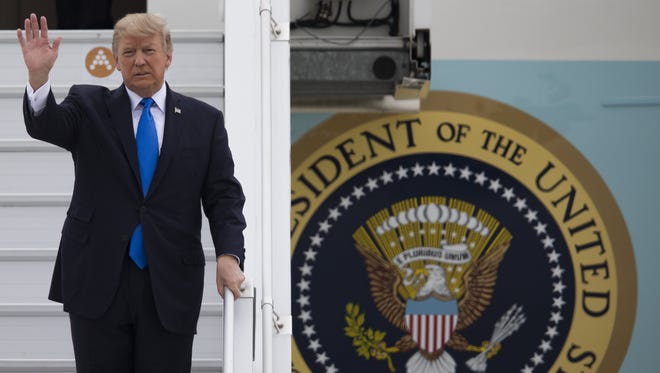Analysis: Trump isn't changing, and that's both good news and bad news for his agenda
 Susan Page
Susan PageWASHINGTON — President Trump's greatest political asset is also turning out to be his most damaging governing liability: After six months on the job, he hasn't changed.

Trump is still the disruptor who defied the Republican establishment and the chattering class by winning the GOP nomination and then the White House against all odds. With few traditional allies to rely on, candidate Trump won by waging unapologetic attacks on political norms and niceties.
But to get anything done in office, President Trump needs friends.
Now he has lashed out at one of his few original loyalists, Attorney General Jeff Sessions, the first senator to endorse his presidential bid and a regular surrogate on the campaign trail last year. Trump blasted Sessions on Wednesday for his decision to recuse himself from the Russia investigation, a step that enabled and contributed to the decision by Sessions' deputy to appoint a special counsel in the case.
"Well, Sessions should have never recused himself, and if he was going to recuse himself, he should have told me before he took the job," Trump complained in a free-wheeling interview with The New York Times. "And I would have picked somebody else."
Read more:
Analysis: At the six-month milestone, can Trump turn around his struggling presidency?
At six month mark, here are six of Donald Trump's most controversial tweets
The president also castigated Deputy Attorney General Rod Rosenstein — "who is from Baltimore; there are very few Republicans in Baltimore, if any" — and special counsel Robert Mueller, a former director of the FBI. The president warned Mueller not to expand his inquiry into Trump family finances unrelated to Russia. "That's a violation," he said, refusing to answer when asked whether he might fire Mueller if he did.
For their part, Sessions and Rosenstein declined to defend themselves — or Charm City, for that matter — in measured responses.
They appeared at a Justice Department news conference Thursday called to announce the takedown of an Internet marketplace for drugs, weapons and other illicit items. But Trump's overnight remarks dominated the session instead.
"I have the honor of serving as attorney general," Sessions said. "We love this job. We love this department. And I plan to continue to do so as long as that is appropriate."
"We're working here every day to advance the priorities of the Department of Justice," Rosenstein said. "I was proud to be here yesterday; I'm proud to be here today, and I'll be proud to be here tomorrow."

While the president has the legal authority to fire the officials he appoints, it's hard to overstate the political conflagration that would erupt if he ousted Sessions or Rosenstein, or if he ordered the Justice Department to oust Mueller. His decision to fire FBI director James Comey created a firestorm of its own and fueled allegations of obstruction of justice, now apparently part of Mueller's inquiry.
And his willingness to denigrate one of his staunchest supporters — someone who as Alabama senator stood up for Trump when none of his colleagues were willing to do so — could have repercussions on his efforts to persuade members of Congress to support his proposals to pass a budget, overhaul health care, cut taxes, invest in infrastructure and more.
That's a point Senate Democratic leader Chuck Schumer was quick to make on Twitter.
"Two words to @SenateGOP when @realDonaldTrump says "I'll have your back" when you vote to repeal health care," Schumer posted. "Jeff Sessions."
The president didn't mention Sessions' efforts to pursue other administration priorities, from cracking down on so-called sanctuary cities to defending the Trump immigration ban in the courts. The Justice Department unveiled major indictments against health-care fraud last week and progress against the dark web Thursday, an announcement that might have garnered attention on another day.
Instead, the president cast Sessions' job performance entirely in terms of questions about his loyalty to him, and every question at the news conference centered on that.
At the midpoint of his first year in office, Trump bragged about his achievements.
"I think I've done more than anyone else," he said, referring to the record of his predecessors during their first six months. "So the bottom line is this: The country's doing well. We are, we are moving forward with a lot of good things. The unemployment is the lowest it's been in 16 years. The stock market is the highest it's ever been. It's up almost 20 percent since I took office. And we're working hard on health care."
That said, Trump also finds himself enmeshed in Russia investigations by the Justice Department and five congressional committees that have created a darkening cloud over his White House, and he has yet to pass a single major legislative initiative. He has run headlong into the separation of powers that gives Congress and the courts the ability to thwart his plans.
His approval-disapproval rating Thursday in the rolling three-day Gallup Poll was 36%-59%. That's by far the worst of any modern president at six months. But the voters who elected him have mostly stuck with him. Nearly nine of 10 Trump voters said in a Reuters/Ipsos poll released Thursday that they would vote for him again.
What he hasn't done is to win over the voters who didn't support him, or to reassure them that he has the temperament and character a president needs.
"I think it's clear that Trump's unconventional style, willingness to defy convention and to say things normal politicians don't say helped convince voters in last year's campaign to vote for him," Frank Newport, editor-in-chief of the Gallup Poll, wrote in an analysis of Trump's comparative standing. "Many may have thought he would change his ways once he entered the Oval Office."
For better or worse, he hasn't.
